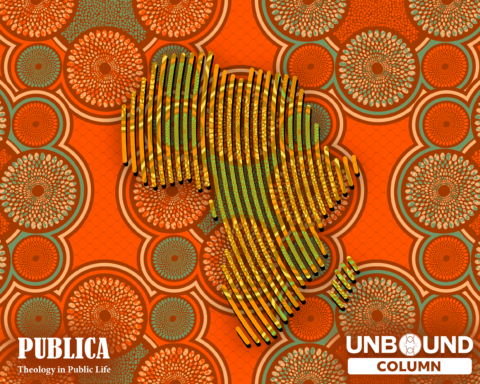The emergence of Abya Yala theology signifies a shift in the theological discourse of Christianity on the continent. European Christian missionaries and soldiers who claimed to rule and control the land introduced Christianity more than five centuries ago. Although some consider this colonization process as a meeting of cultures, civilizations, and the Christianization of the world, the actual results of colonization were the original people’s genocide, slavery, and expropriation of land, among other atrocities.
Europeans brought a form of Christianity forged with the ideas of oppression, subjugation, and denial of spiritual existences, eliminating any aspect of the liberating message inherent in the message of Christ. Anyone who resisted was enslaved and punished for defying compliance with the church’s mandate. Native spiritual practices, ancestral knowledge, beliefs and practices, language, and even ancestral recognition of the native population were considered to be acts of “paganism.”
This historical narrative written by the colonizers limited and transformed spiritual experiences into objective experiences. This transformation has made it difficult to achieve true objectivity of the events and past ways of knowledge since discussions have always been accompanied by the hegemonic, dominating supremacist, and patriarchal way of seeking power and control. Consequently, many theologies were distorted, mistakenly believing that God allowed colonization and forced conversion of native populations. At the same time, in modern terms, colonization is often considered a “development process,” a form of apologetics for the faith and colonizers mainly developed by the ancestors of those who have benefitted from the colonization process.
The church contemplated a vision of “mass civilization and Christianization” centered on baptism and the imposition of new European and Biblical names. Native children were forced to cut their hair short, change their clothing, and attend Sunday services as a form of conversion, simplifying being Christians and what the message of Christianity meant for the native peoples, only the cross. Indeed, the faith focused only on the cross and the suffering of Christ as a way to deal with the subjugation of colonizers with heaven as an afterthought of this life. However, the Christianity brought, taught, and practiced neglected the glorious resurrection of Jesus Christ. This absence of the entire message and the resurrection glory robbed the native population and their descendants of the right to ethnic identity, spiritual belief, or self-identification. Today, messages of political and religious socialization have been intentionally taught that project a transformative and postcolonial story that erases the traces of the barbarism lived during colonization.
From this context, the history of the native peoples of Abya Yala has been exposed to that “imperturbable objectivity,” that is, the colonization process tries to eliminate differentiation in practices, trying to make everyone “equal.” It has undoubtedly been a remarkable story of exterminating our differences and bringing everyone to the idea of monolithic Christian practices.
In reflection on the message of liberation and resurrection center of the Christian message, Abya Yala theology makes it possible to see the ancestral as a decolonial axis and, simultaneously, proposes a theological reflection based on the visibility/salvation of the native population.
The message of death and subjugation during centuries of colonization transformed into Abya Yala theology as a message of resurrection and hope. Like the corn seeds that must be dried before it is sown again in the grown to be reborn, so in the consciences, in the memories, in the voices of our ancestors, the new generations see ourselves growing and re-emerging as a process of resurrection.
In this context, the emergence of a theology from and for the people of Abya Yala is necessary and an act of justice. The ancestral knowledge of the relationship with the creator, the multiple forms of worship and way of spirituality, and the diversity of the people’s practices enrich the valid hopeful message of the gospel; it does not limit or deny it.
Abya Yala Theology seeks to dismantle these oppressive structures inherited from colonial subjugation and recover the liberating message of Christ. The center on the resurrection is particularly relevant, as it offers hope and a path for the native population and their descendants. The resurrection speaks of our communities’ resilience, strength, and ability to overcome adversity and recover our identity and spirituality.
Abya Yala calls for the decolonization of theology, rejecting the Eurocentric and patriarchal frameworks that have dominated Christian thought. It recognizes the need to value and celebrate the diversity of cultures and traditions and to acknowledge the damage caused by the imposition of singular Christian practices and experience worldviews.
Abya Yala theology centers on and believes that the experiences and perspectives of the native population play a vital role in a theology of resurrection. Abya Yala Theology offers a prophetic and inclusive vision of Christianity and an invitation to reconcile the spiritual experiences of native peoples as part of the liberating faith practices of Christianity in Abya Yala.
Yenny Delgado – Psychologist and theologian. Doctoral Candidate in Psychology of Religion at the University of Lausanne. Convener of Women Doing Theology in Abya Yala and Director of Publica Theology. She writes about the intersections between ancestral memories, decolonization, womanism and public faith.
Claudio Ramírez – Theologian and Ph.D. student in Social Science at the Jujuy National University of Argentina. Founding member of the ÑAWI intercultural dialogue community. He writes on ancestral spirituality and eco-theology.






Unbound Social